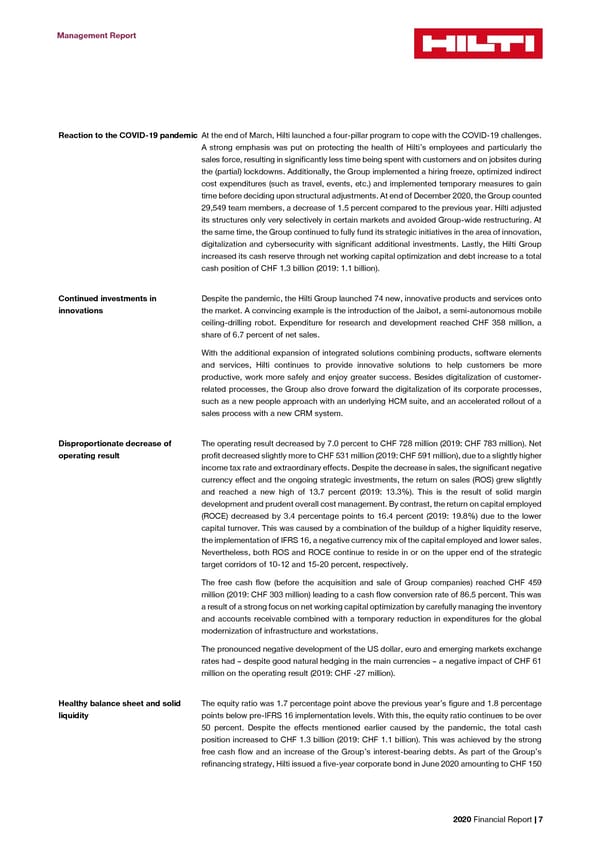Management Report Reaction to the COVID-19 pandemic At the end of March, Hilti launched a four-pillar program to cope with the COVID-19 challenges. A strong emphasis was put on protecting the health of Hilti’s employees and particularly the sales force, resulting in significantly less time being spent with customers and on jobsites during the (partial) lockdowns. Additionally, the Group implemented a hiring freeze, optimized indirect cost expenditures (such as travel, events, etc.) and implemented temporary measures to gain time before deciding upon structural adjustments. At end of December 2020, the Group counted 29,549 team members, a decrease of 1.5 percent compared to the previous year. Hilti adjusted its structures only very selectively in certain markets and avoided Group-wide restructuring. At the same time, the Group continued to fully fund its strategic initiatives in the area of innovation, digitalization and cybersecurity with significant additional investments. Lastly, the Hilti Group increased its cash reserve through net working capital optimization and debt increase to a total cash position of CHF 1.3 billion (2019: 1.1 billion). Continued investments in Despite the pandemic, the Hilti Group launched 74 new, innovative products and services onto innovations the market. A convincing example is the introduction of the Jaibot, a semi-autonomous mobile ceiling-drilling robot. Expenditure for research and development reached CHF 358 million, a share of 6.7 percent of net sales. With the additional expansion of integrated solutions combining products, software elements and services, Hilti continues to provide innovative solutions to help customers be more productive, work more safely and enjoy greater success. Besides digitalization of customer- related processes, the Group also drove forward the digitalization of its corporate processes, such as a new people approach with an underlying HCM suite, and an accelerated rollout of a sales process with a new CRM system. Disproportionate decrease of The operating result decreased by 7.0 percent to CHF 728 million (2019: CHF 783 million). Net operating result profit decreased slightly more to CHF 531 million (2019: CHF 591 million), due to a slightly higher income tax rate and extraordinary effects. Despite the decrease in sales, the significant negative currency effect and the ongoing strategic investments, the return on sales (ROS) grew slightly and reached a new high of 13.7 percent (2019: 13.3%). This is the result of solid margin development and prudent overall cost management. By contrast, the return on capital employed (ROCE) decreased by 3.4 percentage points to 16.4 percent (2019: 19.8%) due to the lower capital turnover. This was caused by a combination of the buildup of a higher liquidity reserve, the implementation of IFRS 16, a negative currency mix of the capital employed and lower sales. Nevertheless, both ROS and ROCE continue to reside in or on the upper end of the strategic target corridors of 10-12 and 15-20 percent, respectively. The free cash flow (before the acquisition and sale of Group companies) reached CHF 459 million (2019: CHF 303 million) leading to a cash flow conversion rate of 86.5 percent. This was a result of a strong focus on net working capital optimization by carefully managing the inventory and accounts receivable combined with a temporary reduction in expenditures for the global modernization of infrastructure and workstations. The pronounced negative development of the US dollar, euro and emerging markets exchange rates had – despite good natural hedging in the main currencies – a negative impact of CHF 61 million on the operating result (2019: CHF -27 million). Healthy balance sheet and solid The equity ratio was 1.7 percentage point above the previous year’s figure and 1.8 percentage liquidity points below pre-IFRS 16 implementation levels. With this, the equity ratio continues to be over 50 percent. Despite the effects mentioned earlier caused by the pandemic, the total cash position increased to CHF 1.3 billion (2019: CHF 1.1 billion). This was achieved by the strong free cash flow and an increase of the Group’s interest-bearing debts. As part of the Group’s refinancing strategy, Hilti issued a five-year corporate bond in June 2020 amounting to CHF 150 2020 Financial Report | 7
 2020 Financial Report Page 8 Page 10
2020 Financial Report Page 8 Page 10